Uber and Lyft drivers in Massachusetts have reason to celebrate as both companies have decided to settle a lawsuit that effectively raised wages to $32.30 an hour.
Both companies have also agreed to give drivers in the state paid sick leave, healthcare, and accident insurance. A big win for labor and worker rights in the state of Massachusetts.
Employees vs. Independent Contractors
On July 14, 2020, then-attorney general Maura Healey filed a suit against Uber and Lyft. The suit disputed the company’s classification of drivers as independent contractors as opposed to employees.
As employees, drivers would be entitled to a minimum wage and various benefits that contractor status did not guarantee them. After four years of legal back and forth, Uber and Lyft capitulated, agreeing that drivers were in fact employees.
Someone Has To Pay
Companies have a huge incentive to label their human capital as “independent contractors” as opposed to employees.
Employers are expected to provide certain benefits and pay for certain expenses for employees that they aren’t for contractors. That includes things like unemployment benefits, worker’s compensation, and 7.65% of the employee’s salary to Social Security and Medicare taxes, among others, such as medical insurance. None of these are required for contractors.
For this reason, classifying drivers as contractors reduces Uber and Lyft’s operating costs and maximizes profits for shareholders. However, these needs and benefits do not simply “go away.” They are transferred onto the contractor, effectively increasing their workplace risk, cutting their employee benefits, and reducing their pay.
Lyft and Uber’s Lawsuit Response
In the Massachusetts lawsuit, Uber will pay $148 million while Lyft will pay $27 million to the state as a part of the agreement. Massachusetts drivers will receive a minimum of $140 dollars each, per the settlement terms.
Both companies will also have to pay minimum wage and provide other benefits in accordance with state labor laws. The Massachusetts settlement provides even greater benefits than the similar case in New York.
The Market Reacts
Uber’s stock declined by about 3% while Lyft’s saw approximately a 4% drop as the market responded to the news.
Allegedly, both companies, had preemptively set money aside in anticipation of a settlement.
The Massachusetts case, which had been pending since 2020 is not the first case of its kind. In addition to the New York Case, the rideshare technology companies have been in an ongoing legal battle in California and are facing further litigation in other states, such as New Jersey.
Moreover, both companies are also pursuing other means of securing their market positioning and profit margins by pursuing legislative bills that allow for them to classify drivers as contractors.
More Legal Battles Ahead
Working against their case is a 2024 Department of Labor revision of contractor-vs-employee classification criteria that added six additional qualifiers to consider when making the distinction in employment type.
A series of unfavorable rulings and settlements led to Uber to file a petition with the U.S. Supreme Court, asking them to review a recent ruling by a California court.
If the U.S. Supreme Court were to overrule the California court’s decision, individual states and their attorney generals would be unable to bring further litigation against the rideshare companies on behalf of drivers who had signed contractor terms with the company. Such a ruling would have prevented the outcomes in both the Massachusetts and New York cases and shield Uber Technologies from the legal battle that still lie ahead.
Whether the U.S. Supreme Court decides to hear the case remains to be seen. But if it does, the ruling would have far-reaching ramifications for the future of labor rights nationwide.


